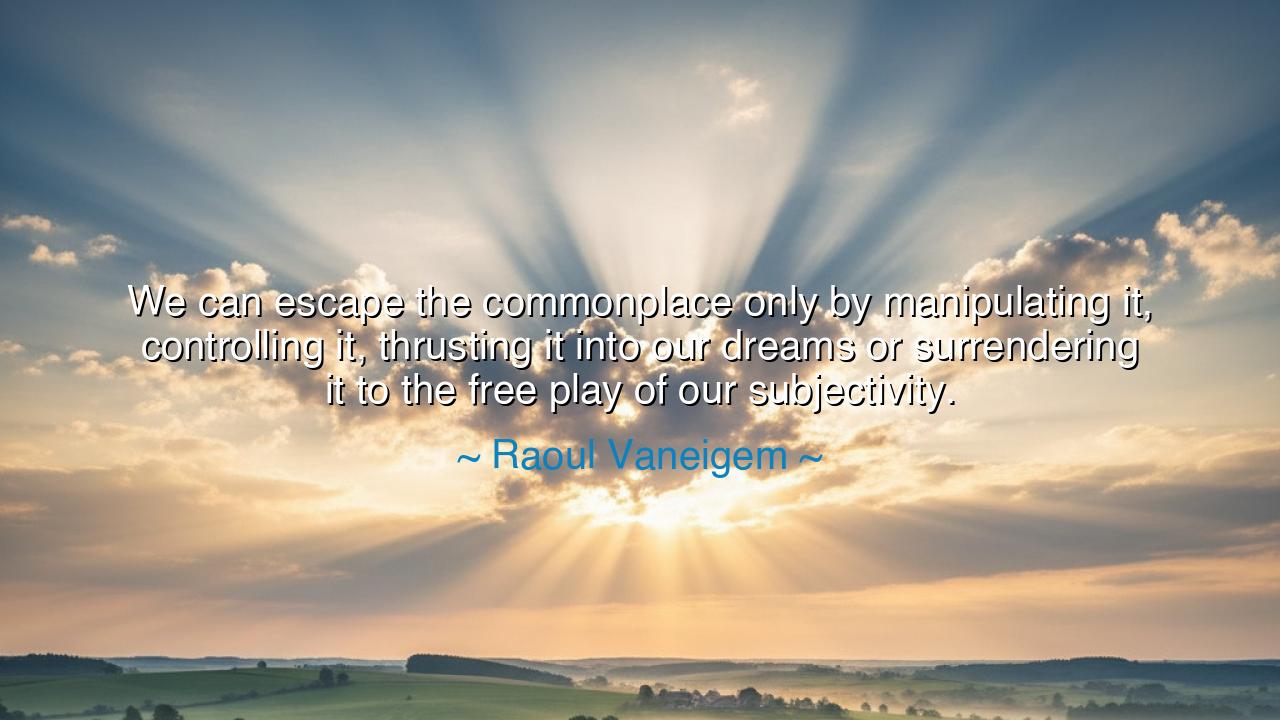
We can escape the commonplace only by manipulating it
We can escape the commonplace only by manipulating it, controlling it, thrusting it into our dreams or surrendering it to the free play of our subjectivity.






In the haunting and luminous words of Raoul Vaneigem, poet of rebellion and philosopher of the human spirit, we are reminded of a truth that whispers beneath the dust of daily life: “We can escape the commonplace only by manipulating it, controlling it, thrusting it into our dreams or surrendering it to the free play of our subjectivity.” This is not a command to flee from reality, but an invitation to transform it — to turn the dull weight of the ordinary into the raw material of creation. For Vaneigem, to live is not merely to exist within the commonplace, but to shape it, to bend it toward meaning, to awaken the fire of individuality within the gray sameness of the world.
Vaneigem wrote these words during the Situationist movement of the 1960s, a time of revolt against the numbness of consumer society. He and his contemporaries saw how life had been reduced to routine, how people moved like ghosts through the machinery of modern existence — working, consuming, obeying, and forgetting how to truly live. In his Revolution of Everyday Life, from which this thought arises, he called upon humanity to reclaim the world not through destruction, but through transformation — to make life itself a work of art. The commonplace, he argued, is not our prison, but our canvas; and our subjectivity, our imagination, is the hand that paints upon it.
The commonplace is the realm of habit — the repetitive patterns of daily existence that dull the edge of wonder. It is the morning commute, the endless errands, the mechanical conversations. Yet even in these moments, Vaneigem saw the potential for alchemy. “Manipulating” the commonplace does not mean denying it; it means playing with it, bending it to the rhythm of one’s dreams. Just as the ancient sculptor shaped dead stone into the semblance of divinity, so too can each of us shape our reality into something luminous. The act of imagination becomes an act of liberation — a rebellion against numbness, an awakening of the soul.
Consider the life of Vincent van Gogh, a man who lived surrounded by the dullness of poverty and rejection, yet who transformed the commonplace into eternal beauty. A chair, a field, a night sky — things that others ignored — became, under his hand, vessels of divine color and passion. He did not escape the world by fleeing it; he escaped by reimagining it. In his surrender to the free play of his subjectivity, he turned suffering into light, and isolation into vision. This is Vaneigem’s lesson embodied: that the artist is not separate from the world, but one who recreates it from within.
To thrust the commonplace into our dreams is to give everyday life the soul of poetry. The ancients knew this well — the farmer who saw gods in the wind, the sailor who spoke to the stars, the lover who found eternity in a single glance. They understood that imagination is not a retreat from reality, but a way of seeing its hidden depths. Vaneigem urges us to recover that sacred vision, to surrender the mundane to the dance of our inner world. When we do so, even the smallest act — walking, cooking, speaking — can become an expression of artistry and purpose.
The lesson is thus one of creation over resignation. Do not accept the world as it is given; reshape it through your perception. When monotony threatens your spirit, let your imagination intervene. Write, sing, draw, dream — not as escape, but as reclamation. Every soul carries within it the power to re-enchant life, to bring color where there was gray, meaning where there was emptiness. This is the revolution Vaneigem called for — not of politics, but of consciousness.
So, my child of both reality and dream, remember: you are not a prisoner of the commonplace unless you choose to be. Manipulate it, as a musician manipulates sound. Control it, as a sailor harnesses the wind. Or else, surrender it wholly to your inner vision — to the wild and radiant play of your subjectivity. For the world belongs not to those who endure it, but to those who transform it. And when you make even the simplest day your canvas, you will find that life, far from being ordinary, is the grandest work of art ever created.






AAdministratorAdministrator
Welcome, honored guests. Please leave a comment, we will respond soon